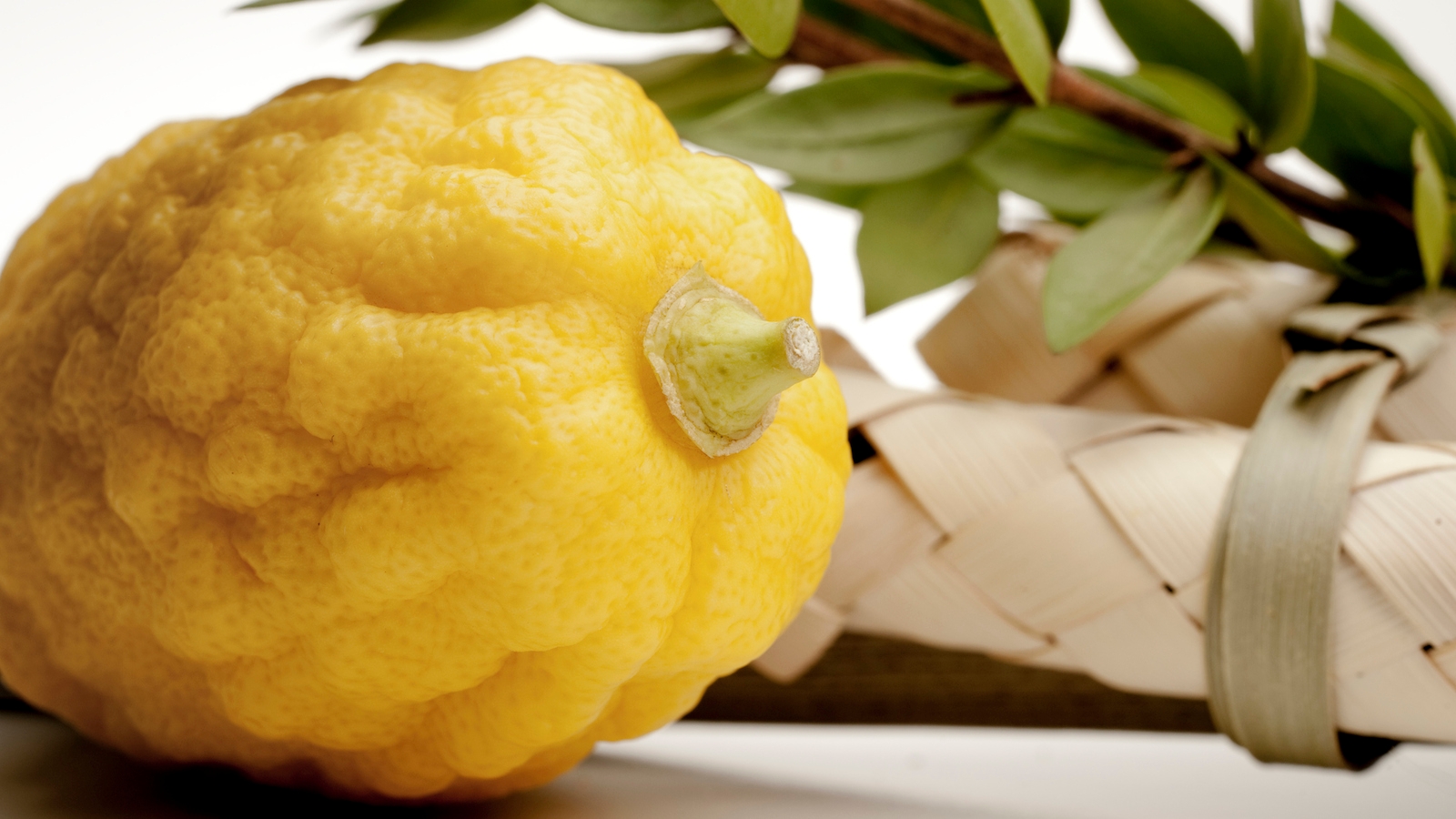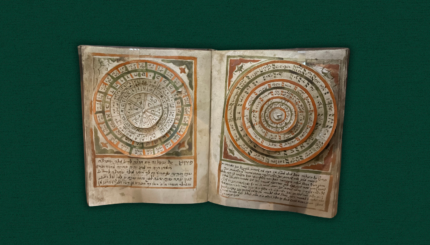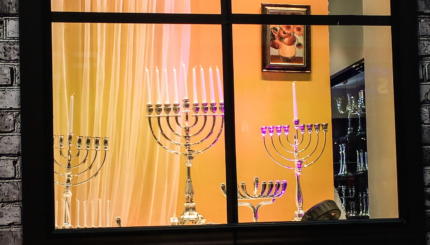Below are some important Hebrew words and terms you may need to know over the week of Sukkot, Shemini Atzeret and Simchat Torah.
Arava — Willow, one of the four species.
Arba minim — Literally “four species,” a quartet of plants used in Sukkot rituals: lulav, etrog, hadas, and arava. They symbolize joy for life and dedication to God. The four species are held and shaken during the Hallel service.
Etrog — Citron, one of the four species.
Geshem — Rain. An additional prayer for rain, Tefillat Geshem, is read on Shemini Atzeret in the fall, introduced in the poetic form of an alphabetic acrostic.
With your help, My Jewish Learning can provide endless opportunities for learning, connection and discovery.
Hadas — Myrtle, one of the four species.
Hakafah — Literally “circuit,” a celebratory processional around the room done on Sukkot and Simchat Torah. On Sukkot hakafot (the Hebrew plural of hakafah) are done holding the four species, except on Shabbat. On Shemini Atzeret, the hakafot are done while singing, dancing, and carrying Torahs.
Hallel — Literally “praise” this short service is a collection of Psalms and blessings recited on festivals and Rosh Hodesh (the new moon) as a display of joy and gratitude.
Hatan/Kallat Bereishit — Literally “Groom/Bride of Genesis,” this is a designation of honor for the person who is called up to the very first aliyah of the Book of Genesis on the morning of Simchat Torah.
Hatan/Kallat Torah — Literally “Groom/Bride of the Torah” this is a designation of honor for the person who is called up to the very last aliyah of the Book of Deuteronomy on the morning of Simchat Torah.
Hol Hamoed — The intermediary days falling between the most sacred days of the festivals of Sukkot and Passover. These days have fewer prohibitions and commandments associated with them than the first and last days of the festivals.
Hoshanah Rabbah — Literally, “the Great Call for Help,” the seventh day of Sukkot during which hakafot are made and Hoshanot are recited. According to one tradition, it is the very last day for God to seal a judgment.
Hoshanot — Prayers of salvation that are chanted on Hoshanah Rabbah while holding the four species. At the end of the hakafot, each person takes a bundle of willow twigs and strikes it on the ground for symbolic purposes. Each prayer begins with the word hoshanah, which means, “Save, I pray.”
Kohelet —The Book of Ecclesiastes, a collection of wisdom, traditionally attributed to King Solomon. It is one of the five books from the part of the Bible called the Writings (Ketuvim) and is read on the intermediary Shabbat of Sukkot.
Lulav — Palm, one of the four species and also the name given to the general bundle of willow, myrtle, and palm branches.
Pitom — Literally “protuberance,” the bulging tip at the blossom end of the etrog. If it falls off naturally, the etrog is considered to be kosher. If it has been knocked off, the fruit is considered to have a blemish and thus be unfit for ritual use as one of the four species.
Shalosh Regalim — Literally “three festivals,” referring to Passover, Shavuot and Sukkot. On these occasions during biblical times Jews went on pilgrimages to Jerusalem to make special offerings at the Temple.
Shemini Atzeret — Literally “the Eighth Day of Gathering,” is the final day of Sukkot, which holds special significance as its own holiday. Jews thank God for the harvest and ask for winter rain to prepare the ground for spring planting.
Simchat Torah — Literally “rejoicing in the Torah,” the holiday that celebrates both the end and renewal of the annual cycle of reading the Torah. Typically, the congregation takes the Torah scrolls from the ark and parades with them in circles (hakafot) around the perimeter of the sanctuary.
Skhakh — The roofing of the sukkah, which is made from natural materials such as bamboo or palm branches.
Sukkah — Literally “hut” or “booth,” a temporary structure that is built in order to be dwelt in for the duration of the holiday of Sukkot. Its purpose is to commemorate the Israelites’ Exodus from Egypt and to make a symbolic gesture that acknowledges humankind’s reliance upon God. The construction of a sukkah follows a set of specific regulations.
Ushpizin — Literally “guests,” the biblical guests that the Zohar teaches are to be invited into the sukkah (along with the poor) during each night of Sukkot. Traditionally these seven guests are Abraham, Isaac, Jacob, Joseph, Moses, Aaron, and David. Today many people add the names of women to the list.
Zman Simchateinu — Literally “the time of our rejoicing,” an expression often used when referring to the days of Sukkot.
aliyah
Pronounced: a-LEE-yuh for synagogue use, ah-lee-YAH for immigration to Israel, Origin: Hebrew, literally, "to go up." This can mean the honor of saying a blessing before and after the Torah reading during a worship service, or immigrating to Israel.
ark
Pronounced: ark, Origin: English, the place in the synagogue where the Torah scrolls are stored, also known as the aron kodesh, or holy cabinet.
etrog
Pronounced: ETT-rahg, Origin: Hebrew, a citron, or large yellow citrus fruit that is one of four species (the others are willow, myrtle and palm) shaken together as a ritual during the holiday of Sukkot.
Shabbat
Pronounced: shuh-BAHT or shah-BAHT, Origin: Hebrew, the Sabbath, from sundown Friday to sundown Saturday.
Shavuot
Pronounced: shah-voo-OTE (oo as in boot), also shah-VOO-us, Origin: Hebrew, the holiday celebrating the giving of the Torah at Mount Sinai, falls in the Hebrew month Sivan, which usually coincides with May or June.
sukkah
Pronounced: SOO-kah (oo as in book) or sue-KAH, Origin: Hebrew, the temporary hut built during the Harvest holiday of Sukkot.
Sukkot
Pronounced: sue-KOTE, or SOOH-kuss (oo as in book), Origin: Hebrew, a harvest festival in which Jews eat inside temporary huts, falls in the Jewish month of Tishrei, which usually coincides with September or October.
Torah
Pronunced: TORE-uh, Origin: Hebrew, the Five Books of Moses.



